When Light Breaks Symmetry: “Exceptional” Effects in Kerr Resonators"

Date and Time
Location
Hosts
Registration
-
 Add Event to Calendar
Add Event to Calendar
- Contact Event Hosts
-
Contact: nicolas.quesada@polymtl.ca
- Co-sponsored by Prof. Nicolas Quesada
Speakers
Lewis Hill of Senior Scientist – Max Planck Institute for the Science of Light
When Light Breaks Symmetry: “Exceptional” Effects in Kerr Resonators

Biography:
Bio: Dr. Lewis Hill is a Senior Scientist at the Max Planck Institute for the Science of Light in Erlangen, Germany. He earned his PhD in Physics from the University of Strathclyde, Glasgow, in 2021, in partnership with the National Physical Laboratory, London.
Following his doctorate, Dr. Hill held an internationally collaborative postdoctoral fellowship between the Max Planck Institute and the University of Strathclyde. He later joined the Max Planck Institute full-time as a Senior Scientist, where he continues to advance cutting-edge research into the photonic effects within Kerr resonators.
Throughout his academic journey, Dr. Hill has received several prestigious honors. These include the Professor John Parrot Prize (Cardiff University), the Fred Stern Prize (University of Strathclyde), and a national recognition award across all natural and life sciences at the 2021 UK Doctoral Awards. He was recently named one of Scotland’s emerging researchers by the Scottish Government and the Scottish Funding Council.
He has been awarded numerous competitive scholarships, including a Mac Robertson Scholarship for a visiting position at the University of Auckland, a UK Government BEIS scholarship for training in Science and Technology Leadership and Management, a SALTO award from the Max Planck Society for an extended research exchange at the Laboratoire Interdisciplinaire Carnot de Bourgogne (CNRS) in France, and most recently a Traveling Lecturer Award from Optica to journey to Québec as a visiting scholar at Concordia University, undertaking a research project funded in part by the Ministère des Relations internationales et de la Francophonie and speaking as guest lecturer at several research institutes in the area including INRS - Institut national de la recherche scientifique, Université Laval, École de technologie supérieure and Concordia.
In addition to his research, Dr. Hill is passionate about student development and supervision. He previously served as Development Officer for the Strathclyde Doctoral School, contributing to institution-wide initiatives to enhance the doctoral experience, and is the current chair of the Optica Nonlinear Optics Technical Group.
Google Scholar Link: https://scholar.google.com/citations?user=oMujq8wAAAAJ&hl=en .
Agenda
11am – 12pm: Technical Seminar
3:00pm – 4:00pm: Student Development Session
Maximising Your Career Potential During Your University Studies and PhD
This session offers practical guidance and candid reflections for students aiming to make the most of their academic journey. Drawing from his own experiences, Dr. Lewis Hill shares the strategies that helped him stand out during his undergraduate and doctoral studies – and that accelerated his transition into a research leadership role.
Topics include:
- Leveraging volunteer work and leadership roles
- Engaging with external stakeholders and industry
- Winning competitive scholarships
- Building a strong online and professional presence
- Crafting an impactful CV
- Building international collaborations and networks
- Navigating transitions between academia and industry
- Dr. Hill will also reflect on lessons learned along the way—what worked, what didn’t, and what he might approach differently with the benefit of hindsight.
The session is designed to benefit students at all levels, whether aiming for careers in academia, industry, or beyond. It concludes with an extended open Q&A where students can raise personalized questions and seek tailored advice.
